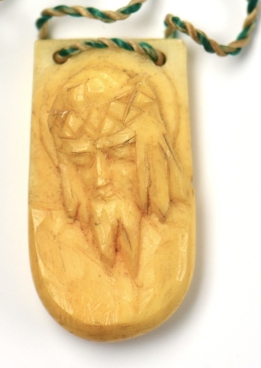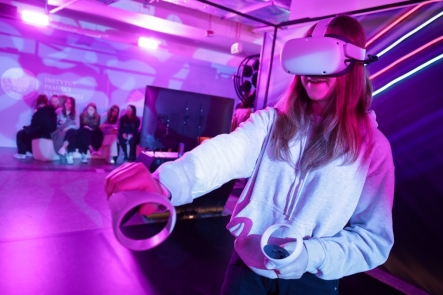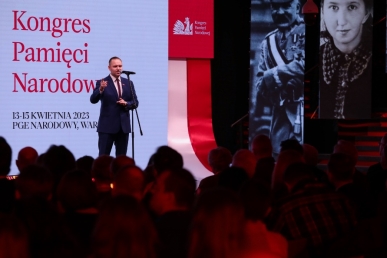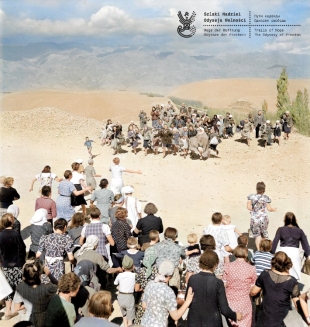Congress of National Remembrance - PGE National Stadium, Warsaw, 13-15 April 2023
The Russian Federation exploits historical falsehoods, using them as one of their arguments justifying the country’s invasion of Ukraine. Seeing the importance of the knowledge of history, the Polish Institute of National Remembrance made the decision to hold a nationwide debate on Polish history and key issues in the area of relations with its neighbours. The event is taking place between 13 and15 April at the PGE National Stadium in Warsaw. The Congress of National Remembrance is attended by Stéphane Courtois, one of the authors of “The Black Book of Communism”. The Institute of National Remembrance is showcasing history in an innovative way, using virtual reality, an international film festival, as well as multimedia exhibitions. The Institute wants to thank everybody who supported Poles suffering the atrocities of the 20th century, as well as launch a debate concerning the German and Soviet crimes and atrocities committed during World War II, war reparations owed by Germany to Poland for the destruction and genocide during that time, as well as the fall of the communist regime in the late 20t century, followed by a period of political upheavals in Central and Eastern Europe.
“Who controls the past controls the future: who controls the present controls the past,” claimed the principle of the totalitarian party described by George Orwell in his prophetic “Nineteen Eighty-Four”. The invasion on Ukraine is an attempt to ground this principle in reality, proven by flags of the Soviet Union, a totalitarian communist state, flying on some Russian tanks crossing the Ukrainian border. Russian propaganda denies the existence of the Ukrainian nation and its distinct historical and cultural tradition.
Although tens or perhaps hundreds of thousands of soldiers and civilians have already died from bullets and bombs on both sides, the Russian Federation does not call the brutal invasion a war. This is no different from what transpired nearly 100 years ago, in 1939, when the Soviet Union joined forces with Nazi Germany to invade Poland - the invasion was never called a war, instead it was described as protecting the people of the Eastern Borderlands of the Second Polish Republic. At that time, hundreds of thousands of Polish citizens of Polish, Jewish, Ukrainian, or Belarusian descent were forcibly deported to Siberia. Today, Ukrainian citizens suffer the same horrible fate.
One of the ancient Roman proverbs says that “History is a life’s teacher”. Poles have a long and painful history of relations with Russia, and these days, many Western politicians and thinkers agree with Poland, understanding its warnings about being dependent on Russia in terms of energy. Many of them did not heed the lesson of the history of communism in Central and Eastern Europe, and the Ukrainians are now paying the terrible price of disregarding the life’s lesson, while the entire world is suffering from the economic crisis brought about by the invasion However, the declining knowledge of history is a growing problem not only in the West - even among Poles, more and more people forget about the past, which can bear horrible consequences for the future. A survey commissioned by the Institute of National Remembrance has shown that nearly 50% of Poles are indifferent to history and see no reason to learn about it. The Institute shows that history is important - even essential and makes an attempt to showcase its value in a fascinating and innovative way.
Exhibitions
Archive Full of Remembrance - the multimedia exhibition features photographs of artefacts donated to the Archive of the Institute of National Remembrance by witnesses of history and their families. The visitors will see a watch unearthed during the exhumation of victims of 1939-1941 Soviet terror against Poles. The watch belonged to a Polish officer, doctor, and athlete Julian Gruner, murdered in Kharkiv along with 3,820 Poles, at the behest of Stalin, whose order has led to the murder of 4,421 Poles in Katyn at the same time, committed by the Communist NKVD. The multimedia exhibition will also showcase testimonies of German atrocities committed during World War II, such as a medallion depicting Christ, fashioned out of a toothbrush handle, gifted to Wanda Madlerowa, Polish teacher imprisoned in the German KL Ravensbrück concentration camp, by a woman she secretly taught. A miniature accordion made out of bread in prison by watchmaker Stefan Dudek is a horrifying memento of the communist regime in Poland, established in the wake of World War II. In addition to 92 kilometres of files, the Archive of the Institute of National Remembrance is also home to numerous mementos and artefacts such as these, owing to the Archive Full of Remembrance project, which sees individuals and institutions donating them to the Institute. Because of that, they can become a part of historical legacy not only for individual families, but for all the world.
“Trails of Hope. The Odyssey of Freedom” is an exhibition that sets out to commemorate the armed struggle of the Polish Armed Forces during World War II, as well as the fate of the civilian population evacuated from the USSR with General Anders’ Army. When Germany invaded the Soviet Union in 1941, Stalin gave his approval to establish an army of 100,000 men – Poles exiled to Siberia. Eventually, the new army was evacuated via Iran and ended up in Italy, where it fought valiantly for freedom. The exhibition recalls the heroic deeds of Polish airmen in the Battle of Britain, as well as the battles of Polish soldiers in Tobruk, Narvik, and Monte Cassino. This exhibition is also a token of gratitude for all the people in the world, who supported the Polish soldiers, as well as the Polish civilians who were rescued with them. It is our way to thank the people living in numerous countries – Iran, Iraq, Israel and Palestine, Italy, France, Belgium, India, Tanzania, Zimbabwe, Mexico, Canada, and New Zealand.
“Patriots. Soldiers. Jews” is an exhibition showcasing Polish citizens of Jewish descent who fought for Poland’s independence and the integrity of its borders in 1914-1921 and in 1939.
“20-40-23” is an exhibition showcasing the outstanding victory over the Bolsheviks in the war of 1920, when at the outskirts of Warsaw Polish forces managed to curb the advance of Lenin’s army, tasked with spreading the communist revolution throughout Europe. On the other hand, the exhibition reminds us of the Soviet massacre in Katyn, which took place in 1940, as some see this genocide as a revenge for the 1920 defeat at Warsaw.
An exhibition of prints by former Polish inmate Maria Hiszpańska-Neumann, depicting life and death in the German camp KL Ravensbrück, along with a showcase of the most valuable archive materials from the times of World War II.
Part of the «Strengthen Your Arm - Serve Your Fatherland» 135th Anniversary of the Polish Falcons in America. exhibition, a collection devoted to the Polish gymnastics’ organisation founded in the United States back in the 19th century. Thousands of volunteers from the organisation took part in the World War I effort and fought for Polish independence in 1918, later contributing to the victory over the Bolsheviks at Warsaw in 1920.
Visitors will have an opportunity to discover the fate of their ancestors at the World War II Victims Information Centre. They will learn more about the importance of the “Personal Losses and Victims of German Repression in 1939-1945” documentation program. During World War II, the German and Soviet occupiers murdered a total of about 6 million Polish citizens, including 3 million of Poles of Jewish descent.
The choice of the date of the Congress of National Remembrance is no coincidence. On that day 80 years ago, the genocide of Polish officers perpetrated by the Soviet NKVD in Katyn, Kharkiv and Mednoe was revealed to the world. During the Congress of National Remembrance, the 4th “Echoes of Katyn” International Film Festival on Totalitarianism is also taking place. Since 2020, the festival has been bringing together film-makers of different genres from around the world. It is an excellent opportunity to watch Polish and international films showing the struggle of the individual against totalitarian systems. The works presented this year include Ukrainian Academy Award candidate -Klondike, as well as Matusia - a story of Polish Catholic nuns who saved some 500 Jewish children from the Nazis during World War II. The screenings will be accompanied by numerous panel discussions and meetings with film-makers.
Educational zone
For 59 percent of Polish schoolchildren, films and video games remain the most important source of historical knowledge, according to the Education for Remembrance report, presented in full at the Congress.
Thanks to the Cyphers Game, all participants have an opportunity to break the Bolshevik ciphers from the time of the 1920 war. The English version of the game is available free of charge on the Steam platform. The same platform also offers the Szybowcowa ‘87 VR app, which allows the users to explore a Communist-era apartment with a clandestine print shop. The player can print a Fighting Solidarity pamphlet, promoting one of the anti-communist organisations that contributed to Poland's independence after 1989.
To activate the youth, we are hosting a hackathon - Histhack. Participants must develop a concept for a scenario for a historical-educational computer game related to modern Polish history (1917-1990). We are also hosting the grand finals of the Historical Board Games Competition. The “Inka Team” workshops will allow the youth attending the Congress to learn more about the history of “Inka” - Danuta Siedzikówna and her family, as well as learn first aid in a practical way. The youngest attendees are to enjoy the story of Wojtek the Bear - one of the soldiers of the Polish II Corps led by General Anders, presented in the form of a theatrical play. Everybody can take part in historical re-enactment shows with period-correct military vehicles.
Academic Zone - historical debates
26 panel discussions devoted to the history of Poland in the 20th century offer numerous opportunities to talk with historians, diplomats, journalists, veterans, witnesses to history and political activists, including Prof. Stéphane Courtois, Prof. Andrzej Nowak, Prof. Stephen Hicks, as well as Anna Maria Anders, daughter of the legendary General Wladyslaw Anders. The debates will revolve around the search and identification of victims of war and repression, the care of the graves of veterans of the struggle for freedom, as well as the ban on glorifying totalitarian systems, the issue of reparations for German atrocities and destruction in World War II and their significance for Polish-German relations, the problems of post-war justice, the assistance provided to Jews by Poles under German occupation, German atrocities in occupied Poland, as well as the involvement of Poles in the struggle against totalitarianism in Poland and abroad. There will be no shortage of talks about Solidarity, the systemic transformation in Poland in the 1990s, and the role of Polish organisations and re-enactment groups in nurturing and passing on national heritage.
The Institute of National Remembrance Publishing House is showcasing its comics, books, and board games, as well as new releases.
In order to best fulfil its mission, the Institute of National Remembrance has commissioned a survey on the memory and historical consciousness of Poles. One of the highlights of the Congress was the presentation of the “Education for Memory” report during the opening conference.
In his letter on freedom, Pope John Paul II wrote: “Today we rejoice in our regained freedom, but freedom cannot only be owned and used. It must be constantly fought for through the truth.” At the Congress of National Remembrance, we want to enjoy the freedom won several decades ago, learn about the history of the struggle for our freedom and discuss how to teach history to our children. Check the website and social media of the Institute of National Remembrance to learn more about Polish history.
The event is held under the honorary patronage of the President of the Republic of Poland, Andrzej Duda.
Watch ads promoting the Congress of National Remembrance
Congress of National Remembrance at the PGE National Stadium in Warsaw
Congress of National Remembrance at the PGE National Stadium in Warsaw
Link to the Congress agenda: https://kongrespamiecinarodowej.pl/?lang=en
Link to the website of the Institute of National Remembrance: https://ipn.gov.pl/en
Facebook: https://www.facebook.com/ipngovplEng
Twitter: https://twitter.com/ipngovpl_eng
Reach out to us at: media@ipn.gov.pl, international@ipn.gov.pl.
Dr Rafał Leśkiewicz, Press Officer of the Institute: rzecznik@ipn.gov.pl.




